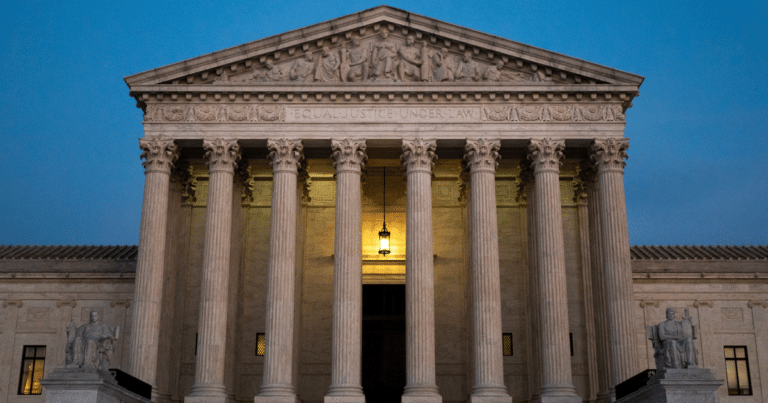
Leftists have been screaming about the U.S. Supreme Court and how conservative judges are ruling in lockstep against all progressive ideology. Activist liberals, including members of Congress, have called for conservative justices to recuse themselves on cases or even be forcibly removed from the positions.
Critics maintain that this is how the left reacts to anything that doesn’t go their way. Ever since the Roe v. Wade abortion law was overturned, liberals have screamed their heads off to remove the justices.
Now, leftists are jumping on a Supreme Court decision where one conservative justice challenged the legal assessment of her colleagues. The challenge was aimed at all the justices – even the liberal members of the high court.
From the New Republican:
Justice Amy Coney Barrett did something interesting last week in an otherwise uninteresting case. The Supreme Court delivered its ruling last Thursday in Vidal v. Elster, which involved First Amendment claims in trademark law.While the decision was unanimous, the reasoning behind it was not. Justice Clarence Thomas took what seemed like a classically originalist path.
Barrett rejected Thomas’s reasoning outright. “Relying exclusively on history and tradition may seem like a way of avoiding judge-made tests,” she wrote in a concurring opinion. “But a rule rendering tradition dispositive is itself a judge-made test.”
The justices ultimately concluded that the government could refuse to register trademarks that use other people’s names without their permission. Thomas surveyed centuries of historical evidence in the English and American legal systems. His conclusion supporting his ruling stated that there was a strong historical tradition of restricting unauthorized trademarks of other people’s names, and the First Amendment allowed it.
Barrett held to her contradictory, yet concurring, opinion. She said she did not see “a good reason to resolve this case” using Thomas’s approach rather than by “adopting a generally applicable principle.”
Sounds like a lot of legal talk, but her dissention within the concurring opinion spoke volumes for her disagreement with some of the foundational logic of Thomas and the other justices.
The justices, particularly the conservative members, have favored an originalist constitutional interpretation when deciding cases. This line of reasoning calls for interpreting the meaning of the Constitution on its “original public meaning.”
Barrett has increasingly challenged this line of reasoning. She has been willing to push back against other originalists when evidence used in decisions as historical is weak. She does not let this logic be her exclusive view when reading the Constitution.
Adding fuel to the fire for liberals, the Vidal v. Elster involved a trademark dealing with former President Donald Trump. Steve Elster, a labor lawyer based in California, sought to trademark the phrase “Trump too small,” along with an illustration of a hand making a “small” gesture. This was spawned after a campaign insult hurled at Trump during the 2016 GOP primaries made note of his personal parts.
Elster sued the federal government for the trademark denial. Thomas, in his ruling against Elster, said the “names clause reflects this common-law tradition by prohibiting a person from obtaining a trademark of another living person’s name without consent, thereby protecting the other’s reputation and goodwill.”
Barrett dissented by saying Thomas was “wrong twice over.” She stated that historical evidence and tradition don’t match on a restriction-by-restriction basis required to conclude this issue.
Leftists are claiming that Barrett’s willingness to dissent in rulings could change the scope of final decisions by the court when decisions come down to a 5-4 vote. As the New Republic opined, liberals believe “the current Supreme Court is one of the gravest dangers facing American democracy today.”
Key Takeaways:
- Justice Barrett stated that Justice Thomas was “wrong twice over” in a recent ruling.
- Her dissenting yet concurring opinion, within a 9-0 vote, struck a chord in the high court.
- Liberal media outlets claimed that the current court is a threat to Democracy.
Source: New Republic
